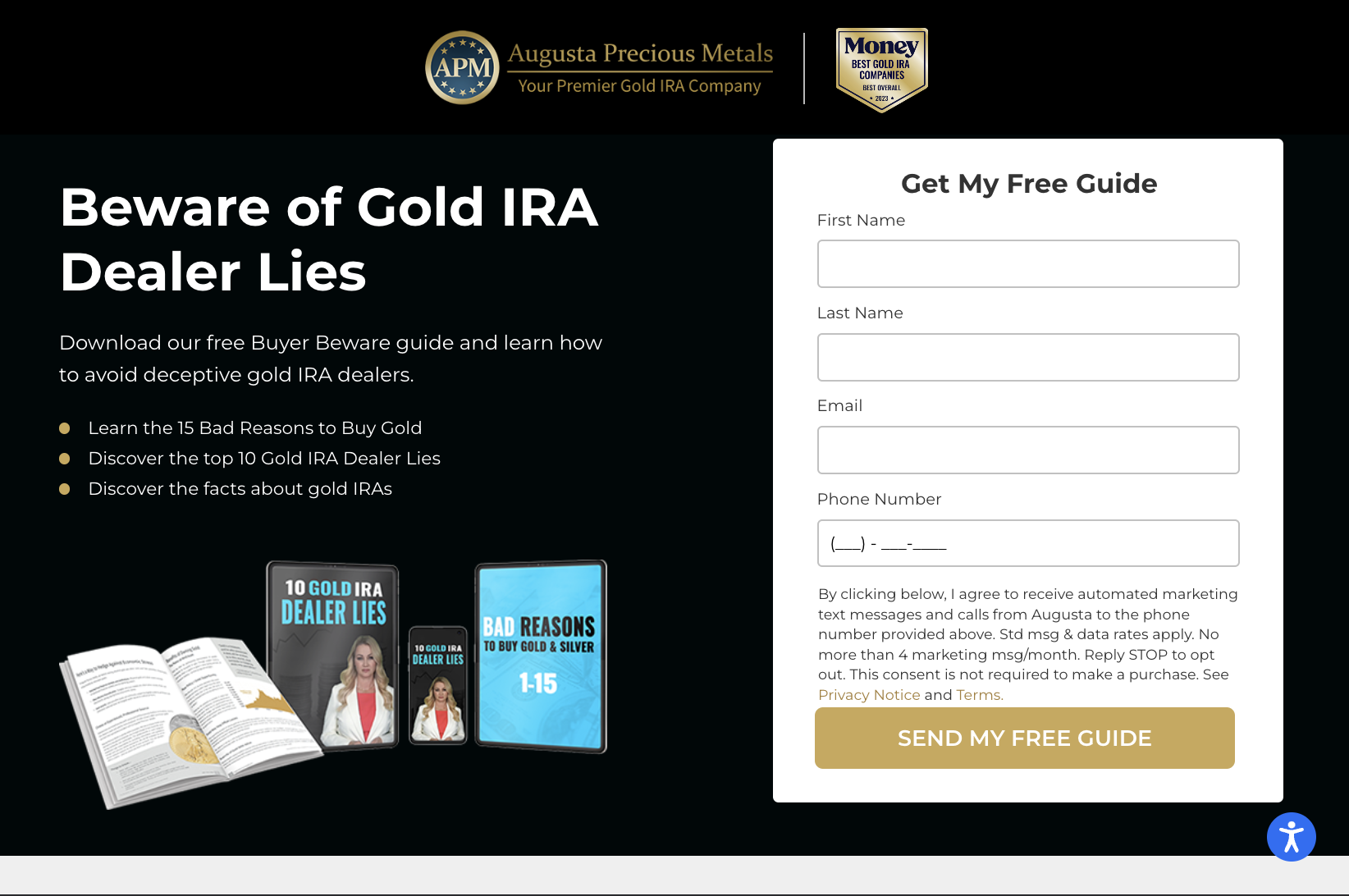Gold Individual Retirement Accounts (Gold IRAs) offer unique advantages and risks compared to traditional IRAs. In this article, you’ll learn about the gold IRA pros and cons, how to choose the right gold IRA company, and alternative ways to invest in gold to secure your financial future.
What is a Gold IRA?
A self-directed IRA, specifically a gold IRA, is an individual retirement account that holds gold as an alternative to traditional assets, such as annuities, stocks, or bonds. Gold IRA is a type of self-directed IRA that allows you to invest in gold by converting your traditional IRA, Roth IRA, Simplified Employee Pension (SEP) plan or 401(k) to gold coins and bullion.
Gold IRAs offer unique benefits and risks compared to traditional IRAs. On one hand, they provide protection against inflation, diversification of investment portfolios, and tax advantages for retirement savings.
On the other hand, gold IRAs may have certain limitations on contributions, storage and maintenance fees, liquidity issues, and penalties for early withdrawals. Let’s take a closer look at all the advantages and disadvantages that a gold IRA entails.
The Pros and Cons of Gold IRAs
Gold IRAs provide an inflation hedge, help diversify your investment portfolio, and come with tax benefits. But, just like other financial tools, they do have some downsides, such as limits on contributions and potentially lower returns than some alternative retirement investments.
If you want to open a gold IRA but don’t know where to begin, start by downloading a free gold IRA guide. This guide has everything you need to set up a gold IRA. It also includes essential information on industry scams, the downsides of investing in gold, and other important details.
Now, let’s explore the advantages and disadvantages of investing in a gold individual retirement account.
Gold IRA Pros
Gold IRAs can be a valuable addition to your retirement planning strategy, thanks to their many benefits. Here are the three main advantages of gold IRAs.
- Hedge Against Inflation
One of the most significant benefits of investing in a gold IRA is its ability to protect your savings from the eroding effects of inflation. Gold has a long-standing reputation for maintaining or even increasing its value during periods of economic distress. For example, during the 2008 housing crisis, the value of gold experienced a significant increase.
By investing in gold through an IRA, you can safeguard your retirement funds from the negative impact of inflation and ensure that your savings maintain their purchasing power over time.
- Investment Portfolio Diversification
A well-diversified investment portfolio is essential for minimizing risk and maximizing potential returns. Gold IRAs can play a crucial role in achieving this balance by providing exposure to an asset class that typically performs well when traditional assets, such as stocks and bonds, underperform. One of the options to consider is gold backed IRA investments, which can further strengthen your portfolio.
Physical gold serves as a counterbalance to risky portfolios, helping to mitigate the effects of market fluctuations on total investments. By allocating a portion of your retirement savings to a gold IRA, you can enhance the overall stability of your portfolio and better weather the ups and downs of the market.
- Tax Benefits
Gold IRAs offer attractive tax advantages for retirement savers. These accounts provide tax-deferred growth, allowing you to save more for retirement without incurring immediate tax liability. However, keep in mind that the Internal Revenue Service (IRS) requires that gold held inside an IRA have a minimum purity level of 99.5%. This strict standard must be met to ensure the gold is eligible for an IRA.
In addition to tax-deferred growth, gold IRAs offer other tax benefits, such as contributions made with pre-tax dollars, reducing taxable income, and tax-exempt retirement distributions for Roth gold IRAs. These tax advantages can make gold IRAs an attractive option for maximizing your retirement savings.
- Physical Ownership
Unlike stocks or bonds, a gold IRA represents a tangible asset. There's an intrinsic value to holding a physical commodity. IRS allows you to include gold, silver, and other physical precious metals like platinum and palladium into your IRA.
Gold IRA Cons
While gold IRAs offer numerous benefits, they also come with certain drawbacks that you should consider before investing.
We recommend that you download our free gold IRA guide. It's packed with valuable information about the potential benefits of investing in gold for retirement, the potential drawbacks, and much more.
- Contribution Limits
Gold IRAs have annual contribution limits that may restrict the amount you can invest in precious metals. For individuals under the age of 50, the contribution limit for 2023 is $6,500, while those over the age of 50 may make an additional catch-up contribution of $1,000.
However, it’s important to note that there is no restriction on the amount that can be rolled over from another IRA into your gold IRA. This means that if you already have an existing 401(k), traditional or Roth IRA, you can transfer funds from that account into a gold IRA without being subject to the annual contribution limits.
- Storage and Maintenance Fees
Gold IRAs necessitate physical storage at an authorized depository, which may incur higher fees than those associated with traditional IRAs. Storage, insurance, and ongoing account maintenance fees may apply, adding to the overall cost of maintaining a gold IRA.
Some examples of IRS-approved depositories include:
- Delaware Depository Service Company
- Brink's Global Services
- International Depository Services
- JPMorgan Chase
- HSBC Bank
- CNT Depository
These organizations provide secure custodial services to financial institutions. When investing in a gold IRA, it’s essential to carefully consider the associated fees and choose a reputable depository to ensure the security of your gold IRA investment.
- Liquidity Concerns
Selling physical gold can be more challenging than liquidating paper assets, potentially affecting your ability to access funds quickly. The potential risks associated with limited liquidity include the difficulty of selling gold investments in a timely manner and the potential for price volatility.
Moreover, the value of gold may experience significant fluctuations over time, making it difficult to forecast the value of your gold investments. This potential for volatility underscores the importance of considering liquidity concerns when investing in a gold IRA.
- Early Withdrawal Penalties
Withdrawing funds from a gold IRA before the age of 59 1/2 may result in a 10% penalty, in addition to taxes on the withdrawn amount. This can be a significant financial setback for those who need to access their retirement funds early due to unforeseen circumstances or emergencies.
However, it’s important to remember that these penalties are intended to encourage long-term retirement savings and discourage early withdrawals. By carefully planning your investments and maintaining an emergency fund separate from your gold IRA, you can avoid the need for early withdrawals and the associated penalties.
Ready to Invest? Choose the Right Gold IRA Company
Choosing the right gold IRA company is a crucial step in securing your financial future. In this section, we’ll discuss the factors you should consider when evaluating gold IRA companies.
- Reputation
- Customer service
- Fees
- Investment options
By carefully researching and comparing gold IRA companies, you can ensure a smooth and secure investment experience.
To assess the reputation of a gold IRA company, consider factors like customer reviews, industry awards, and the length of time the company has been in business. When evaluating customer service, look for the availability of customer service representatives, the response time, and the quality of the customer service provided. Lastly, review the fees associated with setting up and maintaining the account, as well as the types of investments available.
The Top 3 Gold IRA Companies
In this section, we’ll introduce three highly-rated gold IRA companies that provide investors with precious metals and educational resources for retirement savings. These companies have earned their reputations through years of excellent service and commitment to their clients’ financial success.
<b>1. </b><a href="https://goldira.site/pros-and-cons/augusta-precious-metals" rel="nofollow" target="_blank"><b>Augusta Precious Metals</b></a>

With their dedication to customer satisfaction and transparent pricing, Augusta Precious Metals has become the most prominent name in the gold IRA industry.
Augusta Precious Metals offers the following services:
- Assisting retirement savers in opening precious metals IRAs and facilitating gold IRA rollovers
- Providing a variety of gold and silver products
- Offering comprehensive customer service
- Providing fair pricing
<b>2. </b><a href="https://goldira.site/pros-and-cons/goldco" rel="nofollow" target="_blank"><b>Goldco</b></a>

Goldco is a highly regarded precious metals IRA provider in the US, specializing in gold and silver IRAs. They offer a straightforward process for account setup and rollovers, making it easy for investors to transition their retirement savings into a Roth gold IRA account, which includes precious metals such as gold and silver coins, as well as silver coins.
In addition, Goldco provides educational resources to help investors make informed decisions about their gold IRA investments.
<b>3. </b><a href="https://goldira.site/pros-and-cons/american-hartford-gold" rel="nofollow" target="_blank"><b>American Hartford Gold</b></a>

American Hartford Gold is a renowned precious metals dealer, specializing in assisting clients with investments in gold and silver. The company offers competitive rates on gold and silver investments, including coins, bars, and rounds, as well as a wide selection of other precious metals like platinum and palladium.
With their commitment to delivering outstanding customer service and satisfaction, American Hartford Gold has earned an A+ rating from the Better Business Bureau and the trust of thousands of customers.
Potential Risks in Precious Metal Investments
As with any investment, there are potential risks to consider when investing in precious metals. In this section, we’ll discuss the potential risks of investing in gold and other metals, such as market fluctuations, geopolitical events, and changes in mining resources. By understanding these risks, you can make more informed decisions about your gold IRA investments.
Market fluctuations can lead to changes in the value of gold and other metals, making it difficult to accurately forecast the future value of investments. Geopolitical events, such as wars, natural disasters, and economic sanctions, can also impact the value of gold and other metals.
Additionally, alterations in mining resources, including the emergence of new mines or the depletion of existing ones, can affect the value of gold and other metals.
It’s essential to consider these risks when investing in precious metals to ensure a well-rounded investment strategy.
Other Ways to Invest in Gold
If you’re interested in investing in gold but don’t want to deal with the complexities of a gold backed IRA account, there are alternative ways to gain exposure to precious metals. In this section, we’ll discuss other investment options, such as stocks, exchange-traded funds (ETFs), and mutual funds, which provide the benefits of investing in gold without the need for physical storage.
Related article: Best Gold Investment Companies to Buy Gold From
Stocks in gold mining companies offer exposure to the price of gold without requiring physical storage. ETFs are another convenient way to invest in gold, as they are traded on exchanges like stocks and track the price of gold. Mutual funds provide investors with the ability to diversify their portfolios and gain access to gold without the requirement of physical storage.
By exploring these alternative investment options, you can still benefit from gold’s potential as an inflation hedge and portfolio diversifier.
Gold IRA Pros and Cons: Frequently Asked Questions
What is the main downside of a gold IRA?
The main downside of a gold IRA is the early withdrawal penalty. If you want to take money from your gold IRA before age 59 ½, you will have to pay a 10% penalty.
What are the benefits of having a gold IRA?
A gold IRA can provide significant benefits, such as inflation protection, portfolio diversification, and tangible asset security. Historically, gold has been viewed as a hedge against inflation. As the value of paper money falls due to inflation, the relative purchasing power of gold often remains more stable.
Can you make money on a gold IRA?
Yes, you can make money on a gold IRA by investing in IRS-approved precious metals that meet minimum requirements for fineness and purity. However, gold does not pay dividends, meaning the only way to make a return is through selling your gold at a profit.
Gold is also not easily liquidated, so it should be viewed as a long-term investment.
How much money do you need to start a gold IRA?
You need to have a minimum of $10,000 to $50,000 to open and fund a gold IRA account with your IRA, Roth IRA, SEP or 401(k) funds. Setup and maintenance fees may also apply.
What are the main drawbacks of investing in a gold IRA?
Investing in a gold IRA has drawbacks, including limits on contributions, fees for storage and maintenance, potential liquidity issues, and penalties for early withdrawals.
Is a gold IRA a good investment idea?
If you’re worried about inflation, then historically there’s no better inflation hedge than gold. Hence, investing in a gold IRA might be a good option. However, the suitability of a gold IRA as an investment depends on a variety of factors, including an individual's financial situation, investment goals, risk tolerance, and market outlook.
What is a traditional gold IRA?
Essentially, a traditional gold IRA is a type of self-directed IRA that includes gold bullion or bullion coins. While you may come across terms like silver IRA or palladium IRA, they're all variations of self-directed IRAs that allow different types of precious metal investments.
Downsides and Benefits of Gold IRA: Summary
Gold IRAs offer unique benefits and risks compared to traditional IRAs. Benefits of gold IRA include: inflation protection, portfolio diversification, and tax advantages. However, it’s essential to consider the potential drawbacks, such as contribution limits, storage and maintenance fees, liquidity concerns, and early withdrawal penalties.
If you want to learn more about gold IRAs, be sure to download a free gold IRA guide that contains all the valuable information about gold IRA scams, investment benefits and pitfalls, and more.
Pros of a Gold IRA:
- Diversification: Precious metals, including gold, often move differently than traditional stocks and bonds. Having a portion of your retirement assets in gold can diversify your portfolio, potentially reducing the risk of significant losses.
- Hedge Against Inflation: Historically, gold has been viewed as a hedge against inflation. As the value of paper money falls due to inflation, the relative purchasing power of gold often remains more stable.
- Protection against Economic Uncertainty: During times of geopolitical unrest or economic instability, gold often retains its value or even appreciates, as investors seek "safe-haven" assets.
- Physical Ownership: Unlike stocks or bonds, a gold IRA represents a tangible asset. There's an intrinsic value to holding a physical commodity.
Cons of a Gold IRA:
- Storage Costs: Physical gold needs to be stored in a secure, IRS-approved depository. These storage fees can add up over time and erode the potential returns on your investment.
- Liquidity Concerns: While gold can be sold relatively quickly, the process of liquidating gold from an IRA might be more cumbersome than selling stocks or bonds.
- No Dividends or Interest: Unlike stocks or bonds, gold doesn't produce dividends or interest. Your only gain is through appreciation, and this is not guaranteed.
- Potential for Lower Long-Term Returns: Over long periods, equities have historically outperformed gold in terms of returns. Thus, over-reliance on gold might lead to suboptimal growth for retirement funds.
By carefully researching and comparing gold IRA companies, assessing the potential risks of precious metal investments, and exploring alternative ways to invest in gold, you can make informed decisions about your retirement savings and secure your financial future.
This article was written in cooperation with Precious Metals Insights
